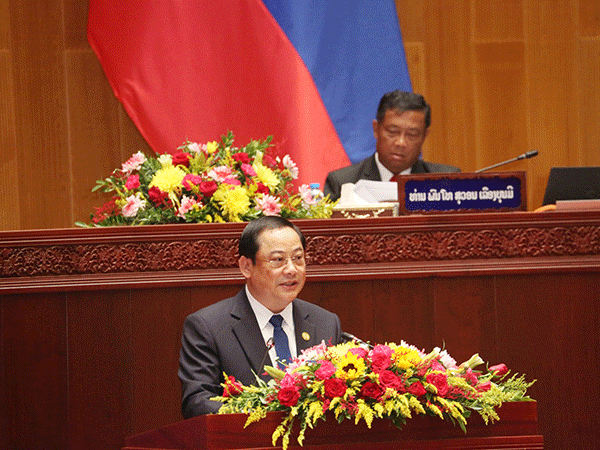Govt pledges intensified action to improve business environment
Prime Minister Sonexay Siphandone has told the National Assembly (NA) that the government will step up efforts to improve the business environment, vowing to cut red tape to ease business operations and attract more investment.
He made the commitment on Monday at the ongoing 7th Ordinary Session of the NA, saying that efforts to streamline the ‘starting business application process’ have gained momentum.
 |
| Prime Minister Sonexay Siphandone. |
This process has been modernised and applicants can now apply online to start a business and can also track the progress of the application online.
“The system is already in place,” the head of government said, adding that the system is interlinked to the databases of the relevant sectors.
The government is also amending the Law on Investment Promotion. A draft of the amendment will be submitted to National Assembly members during the ongoing session, which runs until July 2, for debate and approval.
The amendment aims to align with relevant legislation and incentive policies aimed at attracting more investment, especially policies related to special and specific economic zones, industrial parks, logistics zones and more, according to the Prime Minister.
Minister of Planning and Investment Dr Phet Phomphiphak told the session that the amendment and its related instructions are expected to offer tariff and VAT (value-added tax) incentives.
During the first three months of this year, the government approved 6,007 development projects proposed by local and foreign investors, with a total value of more than US$11 billion. However, only US$666 million (14,319 billion kip) of this amount has been transferred to Laos so far, representing 44.15 percent of the target.
Dr Phet said the business climate had improved a great deal and that the list of concession and control categories had been revised to ease and expedite the consideration and approval process. Efforts have also been made to improve governance and streamline the state organisational structure in an attempt to enhance public service delivery.
Trade and investment have been boosted through enhanced connectivity and logistics, thanks to the upgrade and construction of road links including highways that connect to neighbouring countries, as well as local tourist attractions that also support the tourism industry and related services.
There has been a strong focus on operations at the three key dry ports in Laos, which are located in Savannakhet and Champassak provinces in addition to the Thanaleng Dry Port in Vientiane, and link landlocked Laos to logistics hubs in the region.
Improved connectivity has made Laos an increasingly important land link and logistics centre, thanks to cost effective transport services, especially the rail network, which links Southeast Asian countries to China and also to Europe through the China-Europe rail network.
While efforts to improve the business climate are being intensified to attract more investors, the government also said inspections are being carried out to ensure that businesses fulfil the conditions of agreements made with the government. This is aimed at preventing underhand dealings by companies that enter into a project agreement purely with the intention of selling it on.
Any company whose project makes no progress or is very slow to make progress will be issued with a written warning and provided with a timeframe within which any problems must be resolved.
“If the company is unable to resolve the situation, their contact/agreement will be revoked,” Prime Minister Sonexay warned.
He added that the government is also striving to provide sufficient electricity supplies by fulfilling approved projects, alongside steps to rein in inflation, lower the exchange rate and curb deprecation of the kip in order to create conditions conducive for business operations.
By Souksakhone Vaenkeo
(Latest Update June 12, 2024)
|


